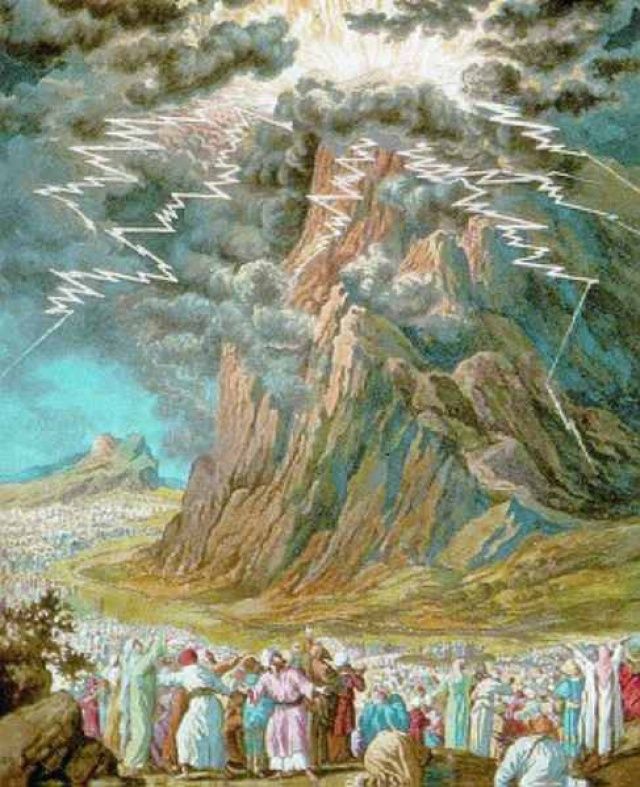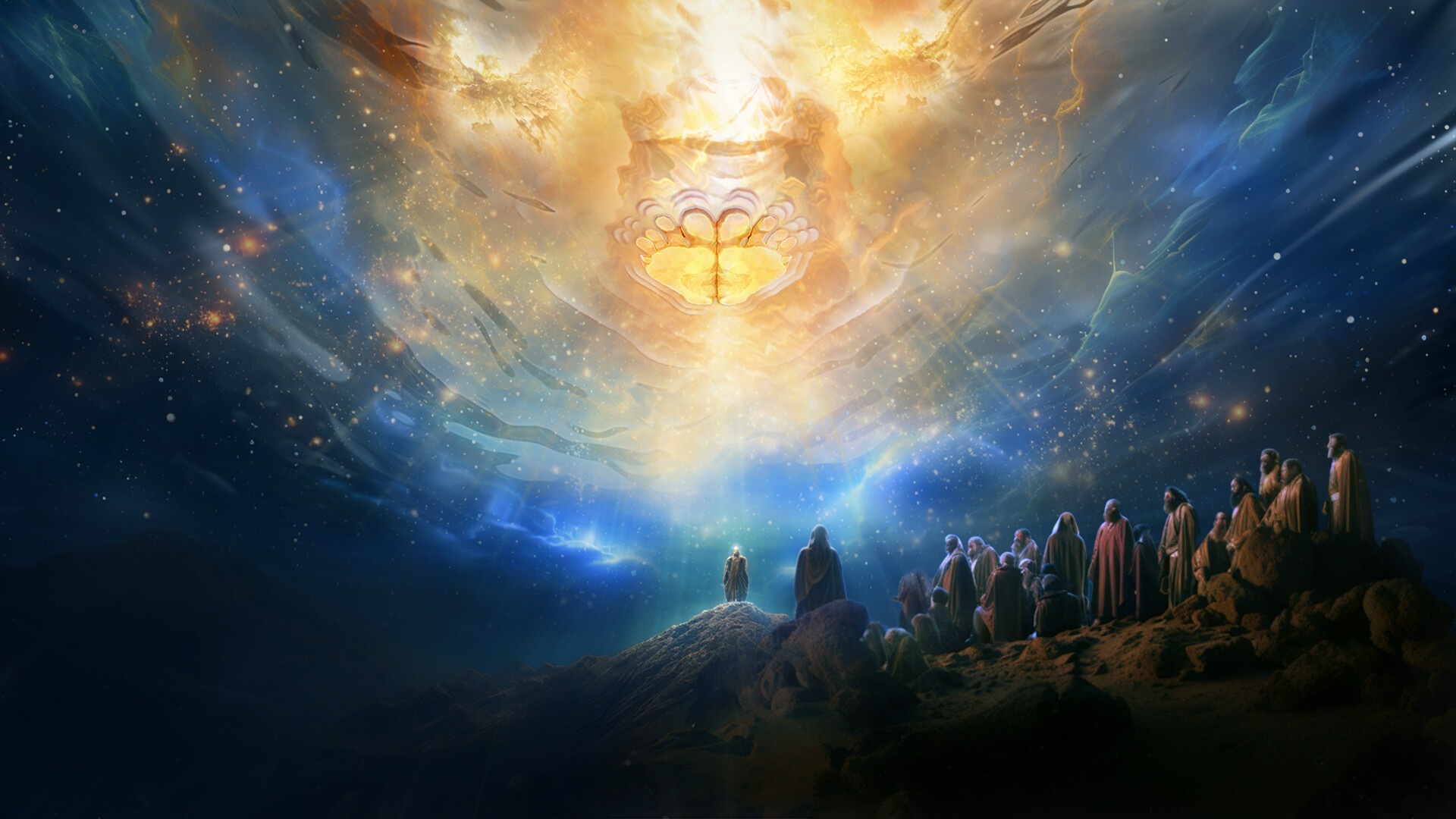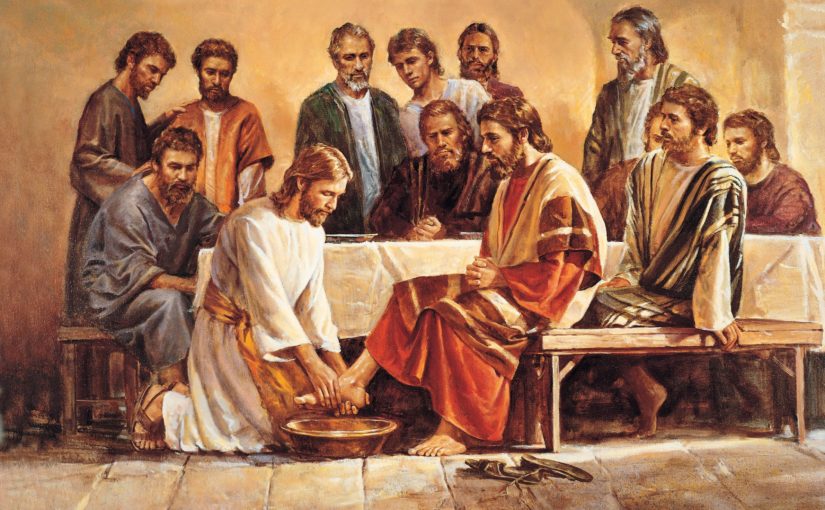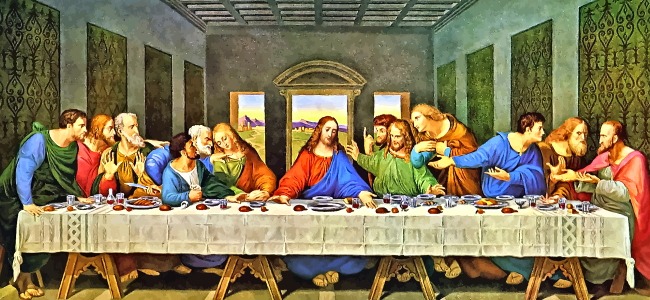My summarized dramatization of Exodus 19-24
The desert air sizzled with heat and anticipation, much like the moment just three months prior when God (Yahweh) miraculously parted the Red Sea. For three days, the Israelites consecrated themselves, washing their dirty, dusty clothes in preparation to meet their Savior at the looming Mount Sinai.
A boundary line was set around the mountain: “Do not go up on the mountain or touch its foot. Anyone who touches the mountain shall be put to death” (Exodus 19:12). This was not just any mountain; it was a sacred rendezvous between God and His people. Recently liberated from slavery in Egypt, the Israelites were about to serve a new master; no, not Pharaoh, but the Lord of Heaven and Earth.
On the third day of consecration, the mountain exploded! Thunder rumbled, lightning flashed, and a thick cloud descended, shrouding the peak. The blast of a trumpet grew louder and louder, piercing every eardrum. Smoke billowed from the summit as the Lord descended in fire. The entire mountain trembled violently.
From that fiery cloud, God’s voice boomed, proclaiming the Ten Commandments to everyone: “I am the Lord your God, who brought you out of Egypt… You shall have no other gods before me” (Exodus 20:2-3).
Huddled at the foot of the fiery mountain, the Israelites listened while shaking with fear, awestruck and terrified by the raw power of His voice. Overwhelmed, the people begged Moses, “Speak to us yourself, and we will listen. But do not have God speak to us, or we will die” (Exodus 20:19).
So, Moses stepped in as their go-between. He climbed the mountain again, where God taught him how to live holy as His chosen people, His “treasured possession among all people,” a “kingdom of priests and a holy nation” (Exodus 19:5-6).
Finally, it was time to seal the covenant. God would become their God, and they would become His people. Moses came down and told everyone what the Lord had said. With one voice, they all promised, “Everything the Lord has said we will do!” (Exodus 24:3).
Moses built an altar at the foot of the mountain with twelve stone pillars, one for each tribe. Young men offered sacrifices of bulls. Moses collected half the blood in bowls and splashed the rest against the altar. Then, holding the sacred blood, he read aloud from the Book of the Covenant (all the laws God commanded from Exodus 20:22 through Exodus 23:33).
Again, the people agreed, “We will do everything the Lord has said; we will obey” (Exodus 24:4-7). Moses then sprinkled the remaining blood on them all, announcing, “This is the blood of the covenant that the Lord has made with you in accordance with all these words” (Exodus 24:8).
Then, something truly amazing happened.
Moses, Aaron, Nadab, Abihu, and seventy elders climbed the mountain. There, right in God’s presence, “they saw the God of Israel. Under his feet was something like a pavement made of lapis lazuli, as bright as the sky itself” (Exodus 24:9-10).
And incredibly, the Bible tells us, “God did not raise his hand against these leaders of the Israelites; they saw God, and they ate and drank” (Exodus 24:11).
After the covenant was sealed with blood and promise, these chosen few were allowed to share a special meal, a covenant meal, right there with God Himself. Moses and Joshua then went even higher into the cloud to receive the stone tablets written by God’s own finger (Exodus 24:12-18).

From Fear to Fellowship
What a profound shift we witness from the terrifying spectacle of Exodus 19 to the serene intimacy of Exodus 24! At the foot of Mount Sinai, the Israelites trembled in fear before a thunderous fire, while just a short distance away, seventy-four elders ate and drank in the glorious presence of the Lord. Even as Moses ascended higher into the cloud to receive the tablets, the glory of the Lord appeared as a devouring fire to those below. Yet, Moses and Joshua remained within that fire for forty days and forty nights.
Consider this: from a population of over two million people, only 74 were permitted to approach the mountain and “worship from afar” (Exodus 24:1). Out of that vast crowd, only two—Moses and Joshua—actually made it to the top! The people at the foot, in the middle, and at the top of the mountain each experienced the Lord in vastly different ways. If all of Israel was consecrated through washing and sprinkled with the blood of the sacrifice, what distinguished the few who drew near from the many who remained afar?
Three key reasons to consider:
First, this foreshadows the Tabernacle that was to come. The outer court, known as the Tent of Meeting, was accessible to everyone. The Holy Place was reserved for priests, while the Most Holy Place was designated for the High Priest alone, and he could enter only once a year and not without blood, for himself and for the entire nation.
Second, animal sacrifice had its limitations. It could only do so much to bridge the gap between a sinful nation and a Holy God.
Lastly, there is a profound call to intimacy with God. Scripture tells us that “the Lord would speak to Moses face to face, as one speaks to a friend” (Exodus 33:11). Joshua, too, longed to remain in God’s presence, refusing to leave after Moses returned to the camp. It is no surprise that the Lord invited both of them to the peak; they did not merely know about God; they knew Him intimately.
But let’s go back to when Moses first encountered God at the burning bush. He “hid his face, for he was afraid to look at God” (Exodus 3:6). Just like the Israelites at the foot of Sinai, he was initially fearful because he did not yet know God. However, as the Lord began to reveal Himself more fully, helping Moses through his insecurities and weaknesses, Moses grew in confidence and boldness. The journey from fear to fellowship, from the foot of the mountain to its peak, reveals the very heart of God’s desire for His people.

The Perfect Sacrifice: A New Covenant of Intimacy
Unlike the blood of bulls that sealed the old covenant, Jesus’ own blood, shed on the cross, established a far better and perfect covenant for us (Hebrews 9:11-14). He became the perfect, spotless Passover Lamb, fulfilling all the requirements of sacrifice. We no longer need animal blood to make things right with God because Jesus completely bridged the chasm between a holy God and us, sinners (John 1:29; Hebrews 10:1-18).
Yet, a distinction remains: between those who worship from afar and those who commune with God face-to-face. This distinction is about intimacy. All who believe and are baptized are washed, sprinkled by His blood, and live in His covenantal hesed (loving kindness). However, not all will choose to cultivate daily intimacy with Jesus. Life gets busy, the enemy is relentless, and the pleasures, riches, and worries of the world constantly threaten to choke out our faith.
But fear not, for the Lord Jesus has given us an incredible gift: the Lord’s Supper. It’s more than a passive ritual; it’s a sacred meal of renewal. When we approach the table, it’s as if we’re sitting down with Jesus Himself in the Upper Room. In this intimate moment, He doesn’t just invite us to eat and drink; He invites us to be cleansed and consecrated.
Think of it as Jesus washing your feet. During the Last Supper, Jesus took on the role of a servant and washed His disciples’ feet, a symbolic act of cleansing and consecration (John 13). Each time we take the bread and wine, Jesus is doing the same for us. He’s washing away the spiritual “gunk” that has accumulated, consecrating us for a fresh encounter with Him and a deeper walk.
The Lord’s Supper is a covenant meal. Just as the Israelites reaffirmed their covenant with God at the foot of Sinai, each time we partake, it’s an opportunity to renew our sacred vows to Jesus, to embrace a fresh start, and to declare, “Everything Jesus taught, we will do!” This simple act of faith in action takes us from the crowds at the foot of the mountain to the most sacred space of all, right into the Most Holy of Holies.
We no longer need an earthly intercessor to approach God’s presence because Jesus “always lives to intercede for [us]” (Hebrews 7:25). Because of His perfect sacrifice, the veil has been torn, and we can now boldly “draw near to the throne of grace with confidence, so that we may receive mercy and find grace to help us in our time of need” (Hebrews 4:16). The table of the Lord’s Supper is where we meet Him at the top of the mountain, in His abiding presence, and truly dine with the King.






“draw near to the throne of grace with confidence, so that we may receive mercy and find grace to help us in our time of need” (Hebrews 4:16).
Awesome blog sir!